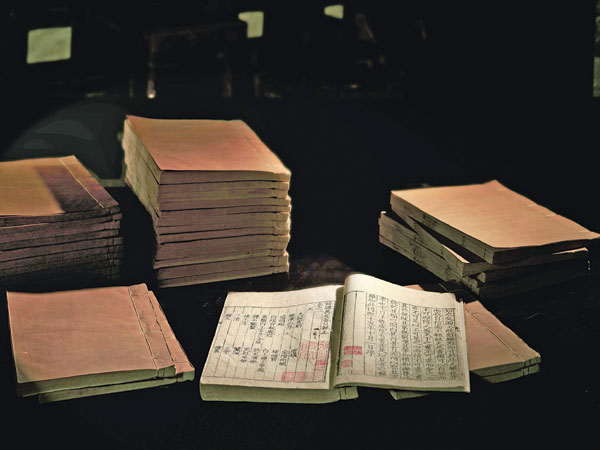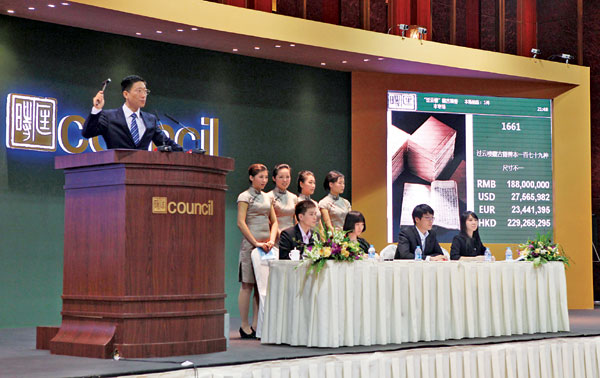
 'Taken 2' grabs movie box office crown
'Taken 2' grabs movie box office crown
 Rihanna's 'Diamonds' tops UK pop chart
Rihanna's 'Diamonds' tops UK pop chart
 Fans get look at vintage Rolling Stones
Fans get look at vintage Rolling Stones
 Celebrities attend Power of Women event
Celebrities attend Power of Women event
 Ang Lee breaks 'every rule' to make unlikely new Life of Pi film
Ang Lee breaks 'every rule' to make unlikely new Life of Pi film
 Rihanna almost thrown out of nightclub
Rihanna almost thrown out of nightclub
 'Dark Knight' wins weekend box office
'Dark Knight' wins weekend box office
 'Total Recall' stars gather in Beverly Hills
'Total Recall' stars gather in Beverly Hills
By the book
Updated: 2012-08-01 10:04
By Mei Jia in Nanjing and Wang Kaihao in Beijing (China Daily)
|
||||||||
 |
|
Part of Guoyun Lou's ancient book collection. Photos Provided to China Daily |
 |
|
A quarter of Guoyun Lou's legendary book collection goes under the hammer at the Council International Auction. |
A major auction of rare books is a landmark that will enhance knowledge sharing, auction regulations and the public's cultural awareness. Mei Jia in Nanjing and Wang Kaihao in Beijing report.
The recent auction in Beijing of Guoyun Lou's ancient book collection has caused a stir due to the sky-high price of 216 million yuan ($33.9 million).This followed Peking University's attempt to acquire the collection by claiming "preemptive rights", which caused a media frenzy.
After the competition between libraries, administrations and cultural enterprises came to a conclusion in late June, it was generally agreed that the record-breaking auction was a landmark that would enhance knowledge sharing, auction regulations and the public's cultural awareness.
"Fortunately, we're competing for cultural things, not for money. It taught us a vivid lesson about the previously underestimated value of ancient books. I think it ended well and nobody really lost," says Ye Jiancheng, director of artifacts management at Phoenix Publishing & Media Group, days after learning his group had finally succeeded in acquiring the collection.
Sitting in his office in Nanjing, Jiangsu province, where Phoenix is based, Ye says he was thrilled to learn that a quarter of Guoyun Lou's legendary book collection was to be sold at the Council International Auction. The treasure trove includes 179 sets of ancient books in 1,292 volumes.
|
Related: |
Guoyun Lou, which literally means "the tower of fleeting clouds" (from the saying "fame and fortune are like fleeting clouds"), is a building in downtown Suzhou where the Gu family had stored its collection for a century.
The Gu family is known for its good taste and conservation efforts, collecting ink wash paintings, calligraphy and paintings, including one from the Yuan Dynasty (1271-1368) that was auctioned off for 400 million yuan in 2011.
Gu's book collection, however, remained a mystery and the auction enabled the public to learn about it for the first time.
Of the books from the collection that were sold, two were printed in the Song Dynasty (960-1279), and three in the Yuan Dynasty. According to 89-year-old Shen Xieyuan, a counselor on Jiangsu's ancient book protection committee, a Song book can be worth up to 100 million yuan.
Shen says the Song books are prime examples because engraving technology and paper-making skills were at their best at the time. Also, they're hard to fake.
"The Guoyun Lou books are unique because they were collected systematically by the family for educational purposes. There are many of them and they cover the four categories of Chinese ancient books - Confucian classics, history, philosophy and literature," says Xu Xiaoyue, director of Nanjing Library, which has 1.6 million volumes.
As early as 1992, the library acquired the other three quarters of Guoyun Lou's books from the Gu family, for just 400,000 yuan.
Xu, a former philosophy professor at Nanjing University, says books are mediums for the passing on of thousands of years of Chinese culture.
"Ancient books are live relics showing what passed among Chinese people, their ways of thinking, aesthetics, faith and mentalities," Xu says. "They're the source of our cultural confidence."
Council Auction Chairman Dong Guoqiang well understands this and says he would have preferred the auction to fail than split up the collection.
Dong doesn't think the deal price is surprising: "It's a unique collection. The chance of another similar collection, which has such high historic significance and cultural value, is remote."
"An apple fell on Isaac Newton's head, and he discovered gravity, though it has always existed," Dong says. "The ancient art works are the apple. Its huge value needed to be determined by someone clever."
To professionals like Shen, Dong's smart tactics created a successful auction. The Council held nationwide previews and a high-level symposium on the auctioned books. It also published a collection of theses after the symposium.
On June 4, Phoenix became the successful bidder. However, Peking University then made a claim and confused the situation.
According to the Law on the Protection of Cultural Relics and Interim Provisions on Auctioning Cultural Relics, State-owned relic collectors, under appointment, have the preemptive right to bid during a certain timeframe. The practice is in tune with auctions in other countries, especially Europe, with the intention of preventing national treasures from leaving the country.
Both the State and the Beijing Municipal Administration of Cultural Heritage were involved in the auction until Jiangsu provincial government prepared a statement saying Phoenix was buying the books, together with Nanjing Library, Jiangsu's provincial library. The deal finally went to Jiangsu.
Peking University was approached for comment but didn't reply.
The deal ended with Phoenix's Chairman Chen Haiyan issuing a statement with eight "thank yous" to all the sides involved, and three more to Peking University for elevating the deal into a public topic.
"It was a duet without rehearsal that we conducted with Peking University," Chen says. "The public was the enlightened audience."
Phoenix's Ye says they're still waiting for the books' return from Beijing to Jiangsu, when the whole Guoyun Lou book collection will be reunited in its home province.
Phoenix has promised to keep the collection forever and will maximize its value due to its publishing businesses at home and abroad.
Encouraged by the buy, Phoenix is to start a company in the United Kingdom to repurchase Chinese relics scattered abroad, says Ye.
Meanwhile, Nanjing Library will also edit, publicize and digitize the Guoyun Lou books it already has.
"In the past 20 years, people in the auction market have tended to emphasize the economic values of these works," says Xie Xiaodong, deputy general manager of Council.
"But Guoyun Lou attracted unprecedented attention and presents a good opportunity for the public to pay attention to the cultural values of the arts.
"Auctioning ancient art works are not just for investment. We have to explore their inner meanings rather than simply sell them."
Tian Tao, a veteran legal expert on auctions and an ancient book collector, sees State-owned enterprises working with State libraries to collect valuable works as a trend. Phoenix is just the first example, he says.
Phoenix's Ye agrees and adds that he knows a lot of families in Jiangsu and Zhejiang provinces have household collections of ancient books.
"At least they'll start to look after them with more attention," he says.
Contact the writers at meijia@chinadaily.com.cn and wangkaihao@chinadaily.com.cn.
Zhou Xueting contributed to the story.
Most Viewed
Editor's Picks

|

|

|

|

|

|
Today's Top News
Health new priority for quake zone
Xi meets US top military officer
Japan's boats driven out of Diaoyu
China mulls online shopping legislation
Bird flu death toll rises to 22
Putin appoints new ambassador to China
Japanese ships blocked from Diaoyu Islands
Inspired by Guan, more Chinese pick up golf
US Weekly

|

|






